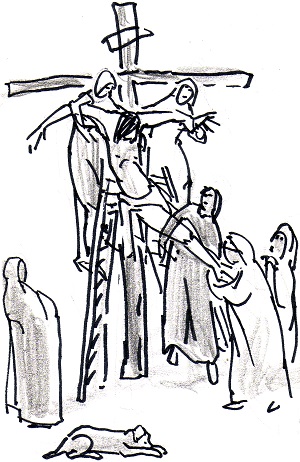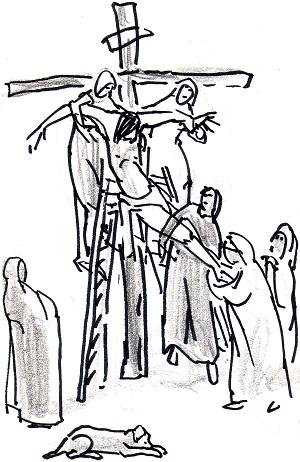

“Yet it was our infirmities he bore” (Isaiah 53:4).
Isa 52:13—53:12; Ps 31: Heb 4:14-16; 5:7-9; John 18:1—19:42
The good in Good Friday is like the good in goodbye, a painful contradiction. It is Jesus’ farewell to the world, devastating and inexplicable. It might have been the day God rescinded Creation itself, back to the void from which it came, for what we did to Jesus, his Beloved Son, murdered on the cross. Instead, his death revealed the depth of God’s mercy, an outpouring of love so great it overcame our collective sinfulness.
The Exultet, sung in the wavering light of the Paschal Candle in a darkened church at the Easter Vigil, dares to call Original Sin our Felix Culpa: “O truly necessary sin of Adam, destroyed completely by the Death of Christ! O happy fault that earned so great, so glorious a Redeemer!”
The Gospels likely began as Passion accounts composed from the wailing lamentations of women who refused to accept that someone so exquisitely good and beautiful had been tortured and killed. The evangelists gathered every scriptural promise to try and make sense of so much unjust suffering and loss. The Servant Songs of Isaiah, the Psalms and the Prophecies had foreseen a different outcome. A grief-stricken and broken community scanned the night horizon for a different dawn.
Faith was written backwards into the story to hold absurdity at bay. The New Testament would be a footnote to the death of Jesus if another event had not occurred, a shocking intervention that revealed not just hope but glory, a new end to the story appearing suddenly in the middle, Jesus alive. Yet, this amazing reversal occurred in the dark interval hidden from us, so we must believe as much as they did to make it real in our lives today.
But today is about the death of Jesus, and John’s account has everything: the garden, betrayal, a sword, trial and denial, Pilate, Barabbas, Golgotha, lots cast on a seamless tunic, his mother, a wine-soaked sponge, final breath, spear thrust, a borrowed tomb. The altar is stripped, the candles extinguished, the church darkened. We depart in silence to ponder the weight of the death of the Lord.
Everything depends on how we interpret the silence that followed Jesus' death, where earthly evidence ceases and faith begins. The thousands who will depart today from the pandemic leave a deafening silence we must interpret as either despair or hope, a void in which the same broken world or a different one can be rebuilt, one more just and caring and respectful of everyone. Whether or not we can wish one another a Happy Easter depends on how determined we are coming out of this crisis to live as Jesus has taught us to live by his death and resurrection.
Advertisement








